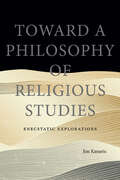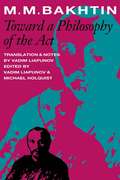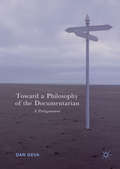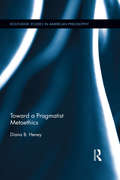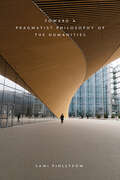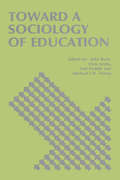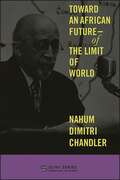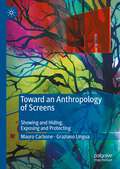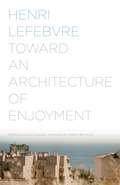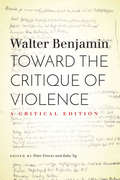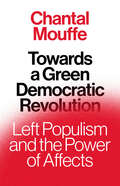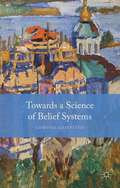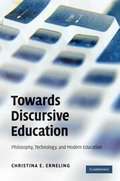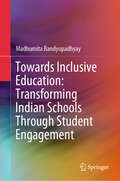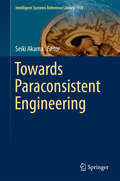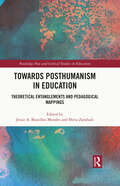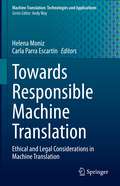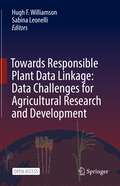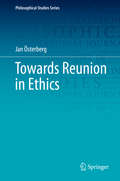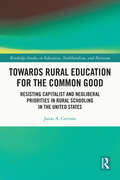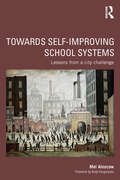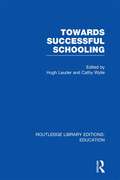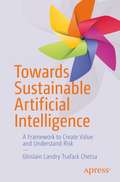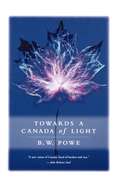- Table View
- List View
Toward a Phenomenology of Terrorism: Beyond Who is Killing Whom (Critical Criminological Perspectives)
by David PolizziThis book examines the socio-psychological dynamics and drivers of terrorism from a humanistic perspective. Most interpret terrorism as meaningless, asocial violence but this book argues that it's not just a case of seeing 'who is killing whom' but that defining and understanding terrorism is configured by historical context and immediate experience. The author argues that these acts of terrorist violence can be interpreted as the external expression of repressed feelings and impulses that have been tabooized by mainstream society. Upon release, these terrorists gain a new 'nomos' which generates a sense of meaning and significance for them. This book draws on psycho-analytical theories of repression, Heideggerian existentialism, Berger’s anthropological concept of culture as ‘nomos’, and Roger Griffin’s analysis of terrorist fanaticism, adding to the understanding terrorism and criminality from a new perspective and beyond the usual literature situated in political science, security/war and peace studies. This book seeks to provide: a definition of terrorism, an account of the psychological theory, an explanation of the nomic dimension of terroristic violence, an exploration of the relevance of the new approach to understanding: Salafi jihadism, Al-Qaeda, Islamic State, the Taliban, White Supremacism, the rise of the Radical Right, and reflections on this for combating terrorism. It appeals to those interested in terrorism, conflict, terrorist radicalization and motivation, international relations, politics and religious politics, and to counter-terrorism agencies.
Toward a Philosophy of Religious Studies: Enecstatic Explorations
by Jim KanarisIn this important work, Jim Kanaris provides a unique approach to the study of religion, aiming to alleviate the methodological and ideological barriers that divide philosophers, theologians, and social scientists. This is a "philosophy of religion" for a wider audience than that designation usually circumscribes, and, for that reason, Kanaris opts for the broader "philosophy of religious studies." He hybridizes insights principally from the works of Bernard Lonergan and Martin Heidegger but also those of Jacques Derrida, Charles Winquist, and Tyler Roberts, among others. Kanaris combines this with a distinctive hermeneutical approach that gives rise to what he calls "enecstatic" philosophy, one that manages the irreducible complexity of one's individuality, a singularity, in the negotiation of one's objects of concern. Toward a Philosophy of Religious Studies is unlike any other book in religious studies. It provides a unique way to surface personal involvement in the study of religion without compromising scholarly objectivity and philosophical integrity.
Toward a Philosophy of the Act
by M. M. Bakhtin Michael Holquist Vadim LiapunovRescued in 1972 from a storeroom in which rats and seeping water had severely damaged the fifty-year-old manuscript, this text is the earliest major work (1919-1921) of the great Russian philosopher M. M. Bakhtin. Toward a Philosophy of the Act contains the first occurrences of themes that occupied Bakhtin throughout his long career. The topics of authoring, responsibility, self and other, the moral significance of "outsideness," participatory thinking, the implications for the individual subject of having "no-alibi in existence," the difference between the world as experienced in actions and the world as represented in discourse--all are broached here in the heat of discovery. This is the "heart of the heart" of Bakhtin, the center of the dialogue between being and language, the world and mind, "the given" and "the created" that forms the core of Bakhtin's distinctive dialogism.A special feature of this work is Bakhtin's struggle with the philosophy of Immanuel Kant. Put very simply, this text is an attempt to go beyond Kant's formulation of the ethical imperative. mci will be important for scholars across the humanities as they grapple with the increasingly vexed relationship between aesthetics and ethics.
Toward a Philosophy of the Documentarian: A Prolegomenon
by Dan GevaThe theme of this book is the documentarian—what the documentarian is and how we can understand it as a concept. Working from the premise that the documentarian is a special—extended—sign, the book develops a model of a quadruple sign structure for-and-of the documentarian, growing out of enduring traditions in philosophy, semiotics, psychoanalysis, and documentary theory. Dan Geva investigates the intellectual premise that allows the documentarian to show itself as an extremely sophisticated, creative, and purposeful being-in-the-world—one that is both embedded in its own history and able to manifest itself throughout its entire documentary life project, as a stand-alone conceptual phase in the history of ideas.
Toward a Pragmatist Metaethics (Routledge Studies in American Philosophy)
by Diana HeneyIn our current social landscape, moral questions—about economic disparity, disadvantaging biases, and scarcity—are rightly receiving attention with a sense of urgency. This book argues that classical pragmatism offers a compelling and useful account of our engagement with moral life. The key arguments are first, that a broader reading of the pragmatist tradition than is usually attempted within the context of ethical theory is necessary; and second, that this broad reading offers resources that enable us to move forward in contemporary debates about truth and principles in moral life. The first argument is made by demonstrating that there is an arc of theoretical unity that stretches from two key founders of pragmatism—Charles Sanders Peirce and William James—through the work of John Dewey and Clarence Irving Lewis. The second argument is made by engaging with contemporary debates concerning the truth-status of the judgments and assertions made in ordinary moral discourse, as well as the role and nature of moral principles. Toward a Pragmatist Metaethics will be of interest to scholars of American philosophy, American intellectual history, and moral and political theorists, as well as anyone interested in the contours and demands of shared moral discourse.
Toward a Pragmatist Philosophy of the Humanities
by Sami PihlströmHumanist scholars often feel the need to defend the humanities. The value of humanistic research is sometimes challenged, as the cultural "reality" investigated by disciplines such as history, literary studies, and theology may seem unclearIn particular, the ontology of the humanities might be considered obscure in comparison to the ontology of the natural sciences. Toward a Pragmatist Philosophy of the Humanities proposes to develop a comprehensive philosophical account of the humanities, focusing on the ontology and epistemology of humanistic inquiry from the standpoint of pragmatism. Sami Pihlström argues that humanistic cognitive pursuits can be interpreted along the lines of a pragmatist theory of inquiry, defending pragmatic realism about the humanities. However, far from leading to any reductive naturalization of the human world, the pragmatist philosophy of the humanities defended by Pihlström takes a distinctively Kantian critical turn in emphasizing the need for transcendental argumentation in the philosophy of the humanities, insisting on the irreducibly ethical dimensions of humanistic scholarship.
Toward a Sociology of Education
by John Beck, Chris Jenks, Nell Keddie and Michael F.D. YoungBy including material from literary, philosophical, and anthropological sources, and by selecting readings which consider educational practice both within and beyond formal educational contexts, this book broadens the character of sociological inquiry in education. The editors bring together material they have found valuable when working with students of education and sociology at all levels. Many of these articles and extracts are either inaccessible or have not been reprinted. The collection should stimulate inquiry about the assumptions underlying current debates on curriculum, streaming, school organization, methods of teachin, and preconceived notions of ability.
Toward an African Future—Of the Limit of World (SUNY series, Literature... in Theory)
by Nahum Dimitri ChandlerExamines the thought of W. E. B. Du Bois, with attention to its potential for reorienting present-day critical theory and political philosophy.Widely known for his probing analysis of W. E. B. Du Bois's early work, in this book Nahum Dimitri Chandler references writing from across the whole of Du Bois's long career, while bringing sharp focus on two later texts issued in the immediate aftermath of World War II-Color and Democracy: Colonies and Peace and The World and Africa: An Inquiry into the Part which Africa Has Played in World History. In these texts, "the problem of the color line," which Du Bois had already characterized as the problem not only of the twentieth century, but of the modern epoch as a whole, is further figured as a global problem, as a horizon linking the contemporary conjuncture of the history of modern systems of enslavement with the ongoing impact of modern colonialism and imperialism on the world's possible futures. On this line of thought, Chandler proposes that the name of "Africa" is a theoretical metaphor that enables a hyperbolic re-narrativization of modern historicity. Du Bois thus emerges as an exemplary thinker of history and hope for the world beyond the limit of the present.
Toward an Anthropology of Screens: Showing and Hiding, Exposing and Protecting
by Mauro Carbone Graziano LinguaThis book shows that screens don’t just distribute the visible and the invisible, but have always mediated our body's relationships with the physical and anthropological-cultural environment. By combining a series of historical-genealogical reconstructions going back to prehistoric times with the analysis of present and near-future technologies, the authors show that screens have always incorporated not only the hiding/showing functions but also the protecting/exposing ones, as the Covid-19 pandemic retaught us. The intertwining of these functions allows the authors to criticize the mainstream ideas of images as inseparable from screens, of words as opposed to images, and of what they call “Transparency 2.0” ideology, which currently dominates our socio-political life. Moreover, they show how wearable technologies don’t approximate us to a presumed disappearance of screens but seem to draw a circular pathway back to using our bodies as screens. This raises new relational, ethical, and political questions, which this book helps to illuminate.
Toward an Architecture of Enjoyment
by Henri LefebvreToward an Architecture of Enjoyment is the first publication in any language of the only book devoted to architecture by Henri Lefebvre. Written in 1973 but only recently discovered in a private archive, this work extends Lefebvre&’s influential theory of urban space to the question of architecture. Taking the practices and perspective of habitation as his starting place, Lefebvre redefines architecture as a mode of imagination rather than a specialized process or a collection of monuments. He calls for an architecture of jouissance—of pleasure or enjoyment—centered on the body and its rhythms and based on the possibilities of the senses.Examining architectural examples from the Renaissance to the postwar period, Lefebvre investigates the bodily pleasures of moving in and around buildings and monuments, urban spaces, and gardens and landscapes. He argues that areas dedicated to enjoyment, sensuality, and desire are important sites for a society passing beyond industrial modernization. Lefebvre&’s theories on space and urbanization fundamentally reshaped the way we understand cities. Toward an Architecture of Enjoyment promises a similar impact on how we think about, and live within, architecture.
Toward the Critique of Violence: A Critical Edition
by Walter BenjaminMarking the centenary of Walter Benjamin's immensely influential essay, "Toward the Critique of Violence," this critical edition presents readers with an altogether new, fully annotated translation of a work that is widely recognized as a classic of modern political theory. The volume includes twenty-one notes and fragments by Benjamin along with passages from all of the contemporaneous texts to which his essay refers. Readers thus encounter for the first time in English provocative arguments about law and violence advanced by Hermann Cohen, Kurt Hiller, Erich Unger, and Emil Lederer. A new translation of selections from Georges Sorel's Reflections on Violence further illuminates Benjamin's critical program. The volume also includes, for the first time in any language, a bibliography Benjamin drafted for the expansion of the essay and the development of a corresponding philosophy of law. An extensive introduction and afterword provide additional context. With its challenging argument concerning violence, law, and justice—which addresses such topical matters as police violence, the death penalty, and the ambiguous force of religion—Benjamin's work is as important today as it was upon its publication in Weimar Germany a century ago.
Towards A Green Democratic Revolution: Left Populism and the Power of Affects
by Chantal MouffeHow to rebuilt left populism around the demands for the Green Democratic RevolutionIn recent years, the promises of the populist moment have faltered, as seen in the defeats of Jeremy Corbyn, Bernie Sanders, Jean-Luc Melenchon. In addition, the pandemic has brought about a strong need for protection, creating a favorable terrain for authoritarian forms of politics. This new situation represents a challenge for the left, whose rationalism and modernist idea of progress is rightly suspicious of such demands. How, therefore, can the left deal with the economic, social and ecological crisis that the pandemic has brought to the fore?Chantal Mouffe argues that the left should not underestimate the importance of affects when developing a strategy for political change. In fact, after years of &‘post-politics&’, we are witnessing a &‘return of the political&’. And in response Mouffe proposes the creation of a broad coalition of movements under the banner of a 'Green Democratic Revolution'. This entails the protection of society and its material conditions in a way that empowers people instead of making them retreat in a defensive nationalism or in a passive acceptance of technological solutions. It is protection for the many, not the few, providing social justice and fostering solidarity.Towards A Green Democratic Revolution is a bold rallying cry for political organisation in the post-pandemic era.
Towards A Science Of Belief Systems
by Edmund GriffithsPeople believe in a great many things: the New Age and the new atheism, astrology and the Juche Idea, the marginal utility theory and a God in three persons. Yet most of us know almost nothing about why other people believe the things they do or indeed about how it feels to believe them. This book presents an objective method for understanding and comparing belief systems, irrespective of their subject matter and of whether or not the investigator happens to agree with them. The method, descriptive logic, is illustrated through analyses of various phenomena, including Zoroastrianism, Dawkinsism, Fabianism, 9/11 Truth, 'alternative' Egyptology, Gnosticism, flying saucer sightings, and the hymns of Charles Wesley. Special attention is given to beliefs that are not supposed to be wholly believed, and to how descriptive logic relates to the materialist conception of history. The book also outlines a new theory of superstition. "
Towards Discursive Education: Philosophy, Technology, and Modern Education
by Christina E. ErnelingAs technology continues to advance, the use of computers and the Internet in educational environments has immensely increased. But just how effective has their use been in enhancing children's learning? In this thought-provoking book, Christina E. Erneling conducts a thorough investigation of scholarly journal articles on how computers and the Internet affect learning. She critiques the influential pedagogical theories informing the use of computers in schools - in particular those of Jean Piaget and 'theory of mind' psychology. Erneling introduces and argues for a discursive approach to learning based on the philosophy of Ludwig Wittgenstein and the psychology of Lev Vygotsky. This book not only addresses an urgent pedagogical problem in depth, but also challenges dominant assumptions about learning in both developmental psychology and cognitive science.
Towards Inclusive Education: Transforming Indian Schools Through Student Engagement
by Madhumita BandyopadhyayThe book offers insight into the intricate process of planning and executing diverse initiatives in the school education sector in India. It delves into the collaborative efforts between administrators, school leaders, teachers, parents, and students to enhance school quality and foster meaningful student engagement. It examines selected states from various geographical zones within its unique socio-political context. It conducts thorough analyses through baseline and end-line studies to track progress or stagnation over time. It addresses critical issues pertaining to student participation in schools, emphasizing the relationship between school progress and student involvement. It also explores the roles played by different stakeholders in this process and offers insightful policy recommendations for future implementation. Overall, the book provides a comprehensive overview of student participation in elementary schools at the state-specific and national levels. With its wide-ranging scope and rigorous methodology, this book is of interest to students, academics, policymakers, educational practitioners, and other stakeholders involved in school education.
Towards Paraconsistent Engineering
by Seiki AkamaThis book presents a collection of contributions from related logics to applied paraconsistency. Moreover, all of them are dedicated to Jair Minoro Abe,on the occasion of his sixtieth birthday. He is one of the experts in Paraconsistent Engineering, who developed the so-called annotated logics. The book includes important contributions on foundations and applications of paraconsistent logics in connection with engineering, mathematical logic, philosophical logic, computer science, physics, economics, and biology. It will be of interest to students and researchers, who are working on engineering and logic.
Towards Posthumanism in Education: Theoretical Entanglements and Pedagogical Mappings (Routledge New and Critical Studies in Education)
by Jessie A. Bustillos Morales Shiva ZarabadiThis edited volume presents a post-humanist reflection on education, mapping the complex transdisciplinary pedagogy and theoretical research while also addressing questions related to marginalised voices, colonial discourses, and the relationship between theory and practice.Exhibiting a re-imagination of education through themed relationalities that can transverse education, this cutting-edge book highlights the importance of matter in educational environments, enriching pedagogies, teacher-student relationships and curricular innovation. Chapters present contributions that explore education through various international contexts and educational sectors, unravelling educational implications with reference to the climate change crisis, migrant children in education, post-pandemic education, feminist activists and other emergent issues. The book examines the ongoing iterations of the entanglement of colonisation, modernity, and humanity with education to propose a possibility of education capable of upholding heterogeneous worlds.Curated with a global perspective on transversal relationalities and offering a unique outlook on posthuman thoughts and actions related to education, this book will be an important reading for students, researchers and academics in the fields of philosophy of education, sociology of education, posthumanism and new materialism, curriculum studies, and educational research.
Towards Responsible Machine Translation: Ethical and Legal Considerations in Machine Translation (Machine Translation: Technologies and Applications #4)
by Helena Moniz Carla Parra EscartínThis book is a contribution to the research community towards thinking and reflecting on what Responsible Machine Translation really means. It was conceived as an open dialogue across disciplines, from philosophy to law, with the ultimate goal of providing a wide spectrum of topics to reflect on. It covers aspects related to the development of Machine translation systems, as well as its use in different scenarios, and the societal impact that it may have. This text appeals to students and researchers in linguistics, translation, natural language processing, philosophy, and law as well as professionals working in these fields.
Towards Responsible Plant Data Linkage: Data Challenges for Agricultural Research and Development
by Sabina Leonelli Hugh F. WilliamsonThis open access book provides the first systematic overview of existing challenges and opportunities for responsible data linkage, and a cutting-edge assessment of which steps need to be taken to ensure that plant data are ethically shared and used for the benefit of ensuring global food security – one of the UN’s Sustainable Development Goals. The volume focuses on the contemporary contours of such challenges through sustained engagement with current and historical initiatives and discussion of best practices and prospective future directions for ensuring responsible plant data linkage. The volume is divided into four sections that include case studies of plant data use and linkage in the context of particular research projects, breeding programs, and historical research. It address technical challenges of data linkage in developing key tools, standards and infrastructures, and examines governance challenges of data linkage in relation to socioeconomic and environmental research and data collection. Finally, the last section addresses issues raised by new data production and linkage methods for the inclusion of agriculture’s diverse stakeholders. This book brings together leading experts in data curation, data governance and data studies from a variety of fields, including data science, plant science, agricultural research, science policy, data ethics and the philosophy, history and social studies of plant science.
Towards Reunion in Ethics (Philosophical Studies Series #138)
by Jan ÖsterbergThis posthumous publication attempts to answer the question of what moral code is the most reasonable. Philosophers often turn to consequentialism or deontological ethics to address this issue. As the author points out, each has valid arguments but each is unable to get the other side to agree. To rectify this, he proposes a third way. Inside, readers will discover a theory that tries to do justice to both sides. The author first details consequentialism and deontological ethics. He also explains their fundamental conflict. One holds the view that you should do what has the best consequences. The other believes that there are actions which are wrong to do even if they have the best consequences. Next, the volume considers various ways to solve this conflict. Would rejecting one theory work? Or, is it possible to somehow reconcile them. The author shows why these solutions fail. He then goes on to present his own. The resulting contractual theory brings together the two opposing ethical convictions. It proposes that what is right and wrong depends on what norms people would agree to. Throughout, coverage explores the psychological, sociological, and historical background of the moral theories discussed. The reason is that moral theories are embedded in social and psychological contexts. They are better understood when the contexts are explicit. This key feature distinguishes the volume from other works in moral philosophy.At the time of his death in July 2011, Jan Österberg was close to completing this manuscript. It was taken up and fully completed by Erik Carlson and Ryszard Sliwinski, both of Uppsala University.
Towards Rural Education for the Common Good: Resisting Capitalist and Neoliberal Priorities in Rural Schooling in the United States (Routledge Studies in Education, Neoliberalism, and Marxism)
by Jason A. CervoneThis book examines the current and future state of rural education in North America through the lens of Franco Berardi’s Futurability. Through critical examination of examples and current trends toward corporatization and privatization of rural education, the volume highlights how future possibilities and social imagination in rural spaces have been limited by neoliberal forces, capitalist interests, and workforce education. Cervone demonstrates how Berardi’s concept of creating future can be embraced to foster critical thought, challenge injustices, and open opportunity. With this line of analysis, the book ultimately supports an ethos of a return to education for the common good. Bringing an important perspective to the field of rural education scholarship, this work will be of interest to scholars and researchers in sociology of education and education policy.
Towards Self-improving School Systems: Lessons from a city challenge
by Mel AinscowThis important new book draws lessons from a large-scale initiative to bring about the improvement of an urban education system. Written from an insider perspective by an internationally recognized researcher, it presents a new way of thinking about system change. This builds on the idea that there are untapped resources within schools and the communities they serve that can be mobilized in order to transform schools from places that do well for some children so that they can do well for many more. Towards Self-improving School Systems presents a strategic framework that can help to foster new, more fruitful working relationships: between national and local government; within and between schools; and between schools and their local communities. What is distinctive in the approach is that this is mainly led from within schools, with senior staff having a central role as system leaders. The book will be relevant to a wide range of readers throughout the world who are concerned with the strengthening of their national educational systems, including teachers, school leaders, policy makers and researchers. The argument it presents is particularly important for the growing number of countries where increased emphasis on school autonomy, competition and choice is leading to fragmentation within education provision. Foreword by Andy Hargreaves, Thomas More Brennan Chair in Education, Boston College, USA
Towards Successful Schooling (Routledge Library Editions: Education)
by Cathy Wylie Hugh LauderThe editors have compiled this critical and comparative study of changes which took place in the New Zealand education system in the second half of the twentieth century. For other Western societies who have felt the impact of New Right policies the New Zealand case is interesting because it provides some indication of how policies of decentralization in education might be used to develop egalitarian and democratic educational policies. In recent years there have been major changes to educational systems in the Western world. Often these changes have been justified by reference to successful educational practices in other countries. However, it is not always possible simply to abstract educational practices from one context and apply them in another successfully. Moreover claims that policies in one country are more successful than those in another have to be treated cautiously: there are always problems in making valid comparisons between the educational performances of different countries. It is important, therefore, that critical and comparative studies are made of educational systems which take full account of the contexts in which they are embedded.
Towards Sustainable Artificial Intelligence: A Framework to Create Value and Understand Risk
by Ghislain Landry Tsafack ChetsaSo far, little effort has been devoted to developing practical approaches on how to develop and deploy AI systems that meet certain standards and principles. This is despite the importance of principles such as privacy, fairness, and social equality taking centre stage in discussions around AI. However, for an organization, failing to meet those standards can give rise to significant lost opportunities. It may further lead to an organization’s demise, as the example of Cambridge Analytica demonstrates. It is, however, possible to pursue a practical approach for the design, development, and deployment of sustainable AI systems that incorporates both business and human values and principles. This book discusses the concept of sustainability in the context of artificial intelligence. In order to help businesses achieve this objective, the author introduces the sustainable artificial intelligence framework (SAIF), designed as a reference guide in the development and deployment of AI systems. The SAIF developed in the book is designed to help decision makers such as policy makers, boards, C-suites, managers, and data scientists create AI systems that meet ethical principles. By focusing on four pillars related to the socio-economic and political impact of AI, the SAIF creates an environment through which an organization learns to understand its risk and exposure to any undesired consequences of AI, and the impact of AI on its ability to create value in the short, medium, and long term. What You Will Learn See the relevance of ethics to the practice of data science and AI Examine the elements that enable AI within an organization Discover the challenges of developing AI systems that meet certain human or specific standards Explore the challenges of AI governance Absorb the key factors to consider when evaluating AI systems Who This Book Is For Decision makers such as government officials, members of the C-suite and other business managers, and data scientists as well as any technology expert aspiring to a data-related leadership role.
Towards a Canada of Light
by Bruce W. PoweB.W. Powe’s visionary work of political philosophy dares to re-imagine Canada. First conceived in 1993, this fully revised, expanded, updated edition, complete with an inspired new introduction that considers Canada in a post-9/11 context, is a landmark book that has become a classic text for understanding the work-in-progress that is Canada. Countering George Grant’s pessimistic Lament for a Nation, which defined the intellectual climate in Canada for decades, Powe argues that our country is in fact a completely original model of what an enlightened polity might be for the 21st century. Here is a passionately inspired portrait of Canada as a communication state – a counter-nation of loose ties and subtle associations where dialogue, ideas, debate and the exchange of information is the currency that holds us lightly together. Towards a Canada of Light points to the urgent realization of a new and liberating way of what it means to be Canadian.

